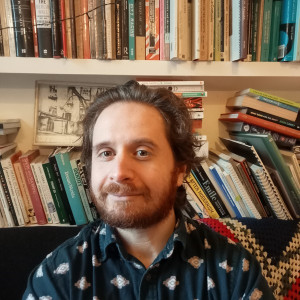Tissue by Imtiaz Dharker is a thought-provoking poem from her moving collection The Terrorist at My Table.
The poem reflects on the fragility and power of paper and its connection to human life and history, it also explores other themes by using the metaphor of tissue paper to question human constructs and how fragile they are in the grand scheme of life.
Paper that lets the light
shine through, this
is what could alter things.
Paper thinned by age or touching,
the kind you find in well-used books,
the back of the Koran, where a hand
has written in the names and histories,
who was born to whom,
the height and weight, who
died where and how, on which sepia date,
pages smoothed and stroked and turned
transparent with attention.
If buildings were paper, I might
feel their drift, see how easily
they fall away on a sigh, a shift
in the direction of the wind.
Maps too. The sun shines through
their borderlines, the marks
that rivers make, roads,
railtracks, mountainfolds,
Fine slips from grocery shops
that say how much was sold
and what was paid by credit card
might fly our lives like paper kites.
An architect could use all this,
place layer over layer, luminous
script over numbers over line,
and never wish to build again with brick
or block, but let the daylight break
through capitals and monoliths,
through the shapes that pride can make,
find a way to trace a grand design
with living tissue, raise a structure
never meant to last,
of paper smoothed and stroked
and thinned to be transparent,
turned into your skin.

Themes of the Poem
One of the main themes in Tissue is fragility. Dharker uses the image of tissue paper to symbolise things in the world that appear strong but are actually delicate and fleeting. This fragility represents both physical objects and more abstract ideas like human life, power, and institutions. For example, she writes about how paper is used for maps, receipts, and official documents, things that have great significance in our daily lives.
The point seems to be that, like tissue, these things can be easily destroyed, emphasising the fragility of human achievements.
The comparison with kites is a metaphor for human life, how our own lives are, in their own way, being blown by the wind and could stop at any moment.
Another key theme is power. While tissue paper may seem weak, the poem suggests that it holds a certain power. The power of paper is symbolic of the power of human structures like contracts and money. These things, just like paper, shape our lives, but they can be altered, torn apart, or reconstructed.
Dharker questions how much power these systems actually hold – hinting at their fragility despite their perceived strength.
Language and Poetic Techniques
The language in Tissue is delicate and measured, much like the paper it describes. Dharker uses simple, clear words, yet they hold profound meaning, especially when considered in the context of power and identity. By focusing on tissue paper, a common and everyday object, she is able to explore complex issues in an accessible way.
Metaphor is a dominant technique in the poem. Tissue paper becomes a metaphor for life, society, and human creations. Throughout the poem, Dharker compares tissue to various things like maps, receipts, and buildings, all of which symbolise human civilisation and the ways we try to organise and control the world. The metaphor expands as she relates tissue to human skin, connecting it to human identity and the fragility of life itself.
Another key technique is enjambment, where sentences flow over the ends of lines without pause. This creates a sense of movement and fluidity, mirroring the themes of change and impermanence in the poem. For example, the lines in the poem are broken in unexpected places, which forces the reader to continue onto the next line to complete the thought.
Some people even think this use of language reflects how nothing is fixed, and everything is in a state of flux. Just like the world Dharker describes.
The poem also makes use of imagery, particularly the image of paper being fragile yet holding great power. Dharker’s descriptions of paper—maps showing “borderlines,” “fine slips” like receipts—convey the significance and authority we give to such fragile objects.
Symbolism is used throughout the poem, particularly in the reference to religious books written on paper. This can be seen as a critique or reflection on how people place faith in written words and documents, even though the paper they are written on can be fragile. The poem seems to ask whether our belief in these symbols is misplaced.
Structure
Tissue is written in free verse, meaning it has no fixed rhyme scheme or metre. This reflects the theme of fluidity and the idea that life cannot be neatly categorised or contained. The lack of a strict structure in the poem mirrors the unpredictable and ever-changing nature of the world Dharker describes.
Free verse is an open form of poetry which does not use a prescribed or regular metre or rhyme and tends to follow the rhythm of natural or irregular speech
The poem is also divided into short stanzas, each consisting of four lines (with the exception of the final stanza). This fragmented structure emphasises the fragility and impermanence of the subject matter.
At its core, Tissue asks readers to reconsider what is important and what is lasting in life. Dharker presents a world where human constructs are fragile and temporary. Yet, we put so much emphasis on these things, believing they represent power and permanence. The poem suggests that instead of relying on these fragile constructs, we should accept the transience of life and look for meaning beyond the material world.
Summarise with AI:












